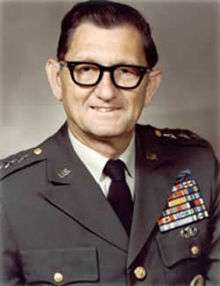Edward Rowny
| Edward Rowny | |
|---|---|
 Lieutenant General Edward Rowny | |
| Born |
April 3, 1917 Baltimore, Maryland |
| Allegiance | United States of America |
| Service/branch | United States Army |
| Years of service | 1941-1979 |
| Rank | Lieutenant General |
| Commands held | 317th Engineer Combat Battalion, 92nd Infantry Division |
| Battles/wars |
World War II Korean War |
| Awards | Combat Infantryman Badge |
Early Years
Edward L. Rowny was born in Baltimore, Maryland on April 3, 1917 where his father had emigrated from Poland in 1912. His mother was born in the United States, her parents having come from Poland in 1887. Rowny was raised by his maternal grandmother Adamina Radziszewski who was well-educated, and spoke five languages fluently. She steeped Edward in knowledge of Polish history and culture particularly about Thaddeus Kosciuszko and Casimir Pulaski, Polish officers who fought in the American Revolution. She introduced him to the music and career of Ignacy Jan Paderewski, the famous Polish composer, pianist and statesman.
General Rowny graduated from the Baltimore Polytechnic Institute, an engineering high school, in 1933. During college, as a Polish American, he chose to pursue a trip through the Kosciusko Scholarship to explore Polish culture and history in Krakow.[1] Rowny earned a BS from Johns Hopkins University in Engineering, and holds degrees from West Point, Yale (MAs in Engineering and International Affairs) and American University (PhD in International Studies).
General Rowny commanded troops in World War II, Korea, and Vietnam. After the 92nd Infantry Division was decimated in the invasion of Italy in 1944, Rowny was brought in as a battalion commander that drove the Germans up the Western coast of Italy until the end of the war. A day after the end of World War II in Europe, he was assigned to planning the invasion of Japan.
Assigned to General Douglas MacArthur, he became his spokesman and one of the planners of the landing of Inchon (September 15, 1950), which forced a North Korean retreat and enabled the taking of Seoul. Rowny air dropped a bridge to cross a chasm permitting the rescue of the surrounded Marines and Army troops at the Chosin Reservoir. He was in charge of the evacuation of U.S. troops which rescued one hundred thousand North Koreans who wished to join South Korea.
During the Vietnam War he tested the helicopter as a platform for the Army to fight insurgency. Subsequently, as deputy chief to General Andrew P. O'Meara he was in charge of relocation of NATO troops from France.
In 1971 he was appointed the US representative to Strategic Arms Limitation Talks (SALT) and held this post under three presidents: Nixon, Ford and Carter. In June, 1979 he retired from the Army in protest over President Carter's signing of the SALT II Treaty which he believed would undermine United States security. He subsequently led the fight to prevent the Congress from ratifying the faulty SALT II Treaty. After the election of President Reagan, General Rowny was appointed to the rank of Ambassador as the President's chief negotiator on Strategic Nuclear Arms (START). During his second term, President Reagan appointed Rowny his Special Advisor on Arms Control. He was awarded the Presidents Citizen Medal with the citation: "Rowny was one of the chief architects of peace through strength", Rowny continued as President George H.W. Bush's special advisor for arms control for the first two years of his term.
In 1990, General Rowny retired from the Government after fifty years of Government service to become an international consultant on negotiations. He also began advising the Administration and Congress on National Security matters and combating terrorism which he continues to this day. In 1992 he authored It Takes One to Tango, a memoir of his service to five Presidents and his dealings with the Soviets.
In 1992, Rowny fulfilled his fifty-year ambition to return the remains of Ignacy Jan Paderewski to Poland. Paderewski was not only a famous composer and pianist but an eminent statesman. He inspired the 13th of President Wilson's 14 points for the Versailles Treaty which resurrected a free and democratic Poland. Paderewski became Poland's first Prime Minister a post he held from 1918 to 1921.
In 2003, Ambassador Rowny became the Vice President of the American Polish Advisory Council (APAC) an organization which promotes Polinia's Agenda and encourages them to vote and become government officials. When President Nicholas Rey died in 2007 Rowny became President of APAC an office he still holds.
In 2004, he established the Paderewski Scholarship Fund to bring Polish University students to Georgetown University to study American style democracy.
In 2005, the 25th anniversary of Solidarity, he received the Truman-Reagan Medal of Freedom from the Victims of Communism Memorial Foundation, along with John Paul II, Anna Walentynowicz and the ten million unsung heroes of first free trade union, Solidarity.
In 2007, Rowny received the Walter Judd Freedom Award from The Fund for American Studies.
Rowny married Elizabeth Ladd in 1994 and has five children from his former wife Mary Rita who died in 1988.
External links
| Wikimedia Commons has media related to Edward Rowny. |
- Interview about the SALT I negotiations for the WGBH series, War and Peace in the Nuclear Age
|